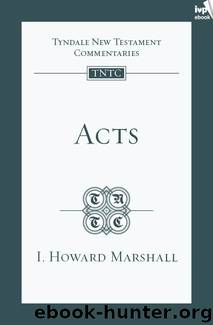Acts (TNTC) by I. Howard Marshall

Author:I. Howard Marshall [Marshall, I. Howard]
Language: eng
Format: epub
Tags: Christian Books & Bibles, Bible Study & Reference, Bible Study, New Testament, Religion & Spirituality, New Testament Study
ISBN: 9781783593170
Amazon: B00V8DX2J4
Publisher: IVP
Published: 2008-08-14T16:00:00+00:00
f. The return journey to Antioch (14:21–28)
Derbe marked the easternmost extremity of the missionary tour, lying as it did on the east border of Galatia. After evangelism there the missionaries retraced their steps, despite the hostile atmosphere which they had left, in order to strengthen and encourage the groups of believers which they had established. In particular, they made sure that some kind of leadership was established in order to consolidate the groups for the future. They then returned direct by sea to Antioch, where they reported on their work to the church, the emphasis lying on the way in which God had led them into successful work among the Gentiles.
There are no real historical difficulties in this section. Its importance lies in its teaching about the way in which the church must live in a hostile environment and equip itself accordingly. The other vital point is the way in which the whole missionary tour is seen as having been directed by God who had opened up the way to the Gentiles. Although it may not have been apparent during the tour, the missionaries were now able to look back over what had happened and recognize the hand of God at work. The stage was thus set for the decisive debate regarding the place of the converted Gentiles in the church (chapter 15).
21–23. The missionary tour reached its climax with successful evangelism in Derbe; there is no mention of any further opposition from the Jews (cf. the silence of 2 Tim. 3:11). So the mission moved into its second phase. Paul’s regular practice was to revisit the churches which he had founded, or at least to keep in touch with them by means of his colleagues or correspondence. In the present case he and Barnabas revisited each of the churches, despite the knowledge that they were returning to cities which were hostile to them; it would presumably have been possible for them to travel on overland eastwards and so reach Antioch instead of going back the way they had come. But there were no further reported incidents. Rather the missionaries were able to encourage the young believers to continue in their belief and not fall away back into Judaism or paganism, and to give them realistic warnings, based on experience, that the way to the kingdom of God is not an easy one. The kingdom of God (1:3, 6; 8:12) is thought of here as the future realm to be established by God into which men may enter by death or by living until the parousia of Jesus (2 Tim. 4:18). Those who set out on this road can expect to be persecuted (1 Thess. 3:2–4; 2 Thess. 1:5; 2 Tim. 3:11–13), but they stand under the protection of the Lord into whose care they were committed by the missionaries (cf. 20:32; 1 Pet. 4:19).
The missionaries appointed leaders in each church, here described as elders. This is the first reference to elders outside the church at Jerusalem; elsewhere we hear
Download
This site does not store any files on its server. We only index and link to content provided by other sites. Please contact the content providers to delete copyright contents if any and email us, we'll remove relevant links or contents immediately.
| Guides | New Testament |
| Old Testament |
The Five People You Meet in Heaven by Mitch Albom(3569)
The Secret Power of Speaking God's Word by Joyce Meyer(3222)
Real Sex by Lauren F. Winner(3023)
Name Book, The: Over 10,000 Names--Their Meanings, Origins, and Spiritual Significance by Astoria Dorothy(2987)
The Holy Spirit by Billy Graham(2953)
0041152001443424520 .pdf by Unknown(2846)
How The Mind Works by Steven Pinker(2816)
ESV Study Bible by Crossway(2778)
Ancient Worlds by Michael Scott(2689)
Churchill by Paul Johnson(2587)
The Meaning of the Library by unknow(2573)
The ESV Study Bible by Crossway Bibles(2551)
The Gnostic Gospels by Pagels Elaine(2531)
MOSES THE EGYPTIAN by Jan Assmann(2417)
Jesus by Paul Johnson(2363)
City of Stairs by Robert Jackson Bennett(2354)
The Complete Dead Sea Scrolls in English (7th Edition) (Penguin Classics) by Geza Vermes(2283)
The Nativity by Geza Vermes(2233)
Ancient Near Eastern Thought and the Old Testament by John H. Walton(2226)
